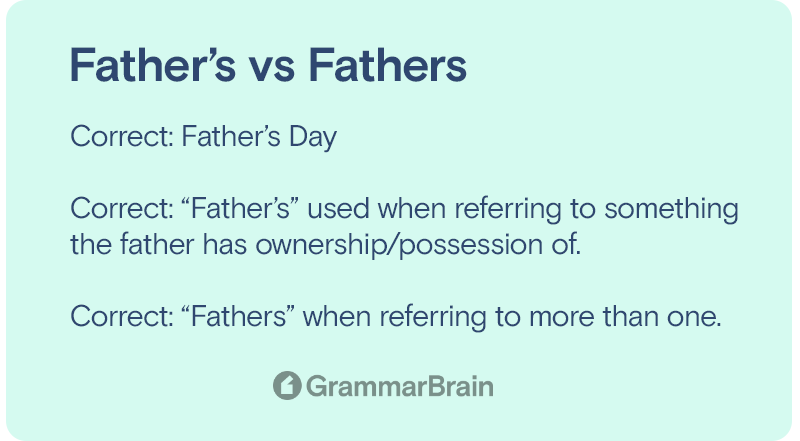What is the correct way to pluralize the word “father?” Is it “fathers” or “father’s” with an apostrophe? When referring to multiple fathers or when referring to “Father’s Day” the holiday, how is it spelled? Learn in this short American English guide.
Distinguishing Father Fathers Father’s Fathers’
Father denotes a person who begets a child. He remains a father even if the child becomes a grown-up individual (he/she). This is simply the English version. It is used differently in other languages. The most prevalent forms of using father are pa, papa, dad, and more.
Babies or infants make their first sounds as “ma”, “pa”, and “da” which are often assumed as if they are addressing their parents.
Let’s start this conversation by understanding what is apt, most prevalent and correct – fathers or father’s?
Comparing it with the widely observed “Father’s Day“, unlike Mother’s day, this day for dads around the world did start with plural form (spelling). It is now a singular possessive.

Differences between fathers and father’s
Which form is it? “Fathers” or “Father’s” with an apostrophe?
It depends on what you are trying to say.
Considering the first word in that order, “fathers” represents many paternal entities i.e. many dads.
While “father’s” represents a single person who is a dad of someone (gender neutral).
Should there be an apostrophe in fathers?
As a rule, the plural form of a word does not require an apostrophe while a reference to a single person uses an apostrophe.
Alternatively, making use of an apostrophe in “Father’s Day” is the traditional way of doing things. It does make sense because it celebrates the individuality of every single person who is a father to someone.
Examples
With an apostrophe before the “s” letter, Father’s day “belongs” to every individual, every single father.
As an example, (1) I have one father, (2) I have two fathers, (3) He is my friend’s father, (4) My father and my friend’s father are good friends. So he is like my father.
All these four examples carry different meanings. It should be noted that Father’s is the possessive form of father.
We use the possessive form of the base form “father” when we wish to depict that “one father” or “my father” or “father”, who is an individual, owns something.
| Word | Explanation (Grammar) |
| Father’s Day | Correct way to spell the holiday, “Father’s Day” |
| Father’s | When referring to the father’s possession of something. |
| Fathers | When referring to more than one father. |
More examples in sentences
- My father is aging.
- We need to take care of our father’s diet.
Remember that we are talking about only one father at this moment. Here, father’s can be replaced by a noun (name) to make it easier to understand.
- Andy is aging.
- We need to take care of Andy’s diet.
Using an apostrophe after the “s” letter
Fathers’ is the possessive form of “fathers”. When a noun already ends with an “s” and we wish to refer to all fathers in general then we need to append an apostrophe after “s”.
- It is time for the monthly father’s haircut.
or
- It is time for the weekly father’s get-together.
Many fathers are involved in this case. We are referring to many dads here.
While it sometimes becomes difficult to adjudge the difference between using and not using an apostrophe in spoken English, it can easily be differentiated in written English.
Understanding the differences between Fathers Day, Father’s Day or Fathers’ Day
This day celebrates every individual who is a dad. So writing Happy Fathers Day is incorrect. We need to refer to an individual, we should use the possessive form of father.
Here both Father’s Day and Fathers’ Day are fine depending upon whom you are referring – an individual or many fathers (plural form).
You should always use “Happy Fathers’ Day” while writing to a whole and should use “Happy Father’s Day” if you have to greet your own father.
Inside this article
Fact checked:
Content is rigorously reviewed by a team of qualified and experienced fact checkers. Fact checkers review articles for factual accuracy, relevance, and timeliness. Learn more.
Core lessons
Glossary
- Abstract Noun
- Accusative Case
- Anecdote
- Antonym
- Active Sentence
- Adverb
- Adjective
- Allegory
- Alliteration
- Adjective Clause
- Adjective Phrase
- Ampersand
- Anastrophe
- Adverbial Clause
- Appositive Phrase
- Clause
- Compound Adjective
- Complex Sentence
- Compound Words
- Compound Predicate
- Common Noun
- Comparative Adjective
- Comparative and Superlative
- Compound Noun
- Compound Subject
- Compound Sentence
- Copular Verb
- Collective Noun
- Colloquialism
- Conciseness
- Consonance
- Conditional
- Concrete Noun
- Conjunction
- Conjugation
- Conditional Sentence
- Comma Splice
- Correlative Conjunction
- Coordinating Conjunction
- Coordinate Adjective
- Cumulative Adjective
- Dative Case
- Determiner
- Declarative Sentence
- Declarative Statement
- Direct Object Pronoun
- Direct Object
- Diction
- Diphthong
- Dangling Modifier
- Demonstrative Pronoun
- Demonstrative Adjective
- Direct Characterization
- Definite Article
- Doublespeak
- False Dilemma Fallacy
- Future Perfect Progressive
- Future Simple
- Future Perfect Continuous
- Future Perfect
- First Conditional
- Irregular Adjective
- Irregular Verb
- Imperative Sentence
- Indefinite Article
- Intransitive Verb
- Introductory Phrase
- Indefinite Pronoun
- Indirect Characterization
- Interrogative Sentence
- Intensive Pronoun
- Inanimate Object
- Indefinite Tense
- Infinitive Phrase
- Interjection
- Intensifier
- Infinitive
- Indicative Mood
- Participle
- Parallelism
- Prepositional Phrase
- Past Simple Tense
- Past Continuous Tense
- Past Perfect Tense
- Past Progressive Tense
- Present Simple Tense
- Present Perfect Tense
- Personal Pronoun
- Personification
- Persuasive Writing
- Parallel Structure
- Phrasal Verb
- Predicate Adjective
- Predicate Nominative
- Phonetic Language
- Plural Noun
- Punctuation
- Punctuation Marks
- Preposition
- Preposition of Place
- Parts of Speech
- Possessive Adjective
- Possessive Determiner
- Possessive Case
- Possessive Noun
- Proper Adjective
- Proper Noun
- Present Participle
- Prefix
- Predicate



